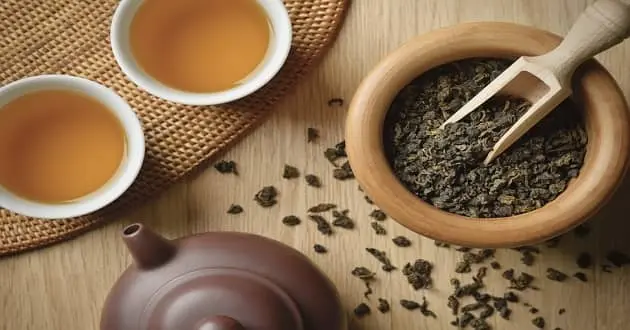Oolong tea 12 Benefits, Side Effects, Caffeine - Good for Diet
Oolong tea Nutrition

| Oolong tea (100g) Nutrition | |||
| Carbohydrate | Protein | Fat | Calories |
| 0.1g | 0.1g | 0.1g | 0.1kcal |
| Main Nutrition | Catechin, polyphenols, flavonoids | ||
| Main Benefits | High blood pressure relief, prevention of cardiovascular disease, and insomnia improvement | ||
| Side Effects | Constipation, stomach, headaches, etc. | ||
Oolong tea is a tea that fermented green tea. It is one of the loved cars worldwide with its fragrant aroma and rich taste. It is mainly drinking in East Asia such as China and Taiwan, and is a dark yellow color with long and dark leaves. The fragrant fermented car provides a variety of health benefits.
Oolong tea Benefits
1. High blood pressure relief
In Japanese studies, oolong tea studies have a great effect on improving blood pressure. It is mainly contained in rich catechins and polyphenols, which can remove vascular waste and relieve hypertension.
2. Weight control
Oolong tea has been loved by many people around the world because of the diet effect. It helps to disassemble the body fat and benefits from body fat, and one study has a weight loss effect of about 3kg when you take tea for 12 weeks.
3. Improvement of insomnia
Appropriate oolong tea intake can increase the quality of sleep. The ingredient called L-theanine can help you keep your sleep deeper and longer. There is a caffeine ingredient, so it is recommended to eat only a small amount.
4. Anticancer
Rich antioxidants in the car can strengthen the immune system in our bodies and at the same time help anticancer action. It can prevent the damage of the cells and has a special effect on various organs such as bronchial cancer and colon cancer.
5. Prevention of aging
The main cause of aging is active oxygen. Flavonoids can prevent aging by eliminating these causes, and a large amount of vitamins included in oolong tea can slow the skin aging.
6. Increase in bone density
Drinking oolong tea is good for bone health and may be good for teeth. Calcium and magnesium, the main ingredients, can naturally increase bone density and are also good for dental health.
7. Relief of menstrual pain
Drinking green tea or oolong tea during menstruation can help relieve pain. One study showed that the pain decreased by 23% when a woman during menstruation drank more than one cup of oolong tea a day. There are differences between individuals, but most women felt that pain was reduced.
8. Increased immunity
Drinking two cups of oolong tea a day is the best way to improve your immunity. Flavonoids can strengthen the immune system and prevent cell damage. This allows you to remove the virus from the body and protect them from diseases such as colds.
9. Oral health
Oolong tea is especially rich in antibacterial ingredients. This can remove bacterial ingredients that cause bad breath in the oral cavity, and can keep the oral cavity clean through antibacterial action. This allows you to maintain better oral health.
10. Stress easing
The fresh fragrance of oolong tea can relieve your stress. It also has a good effect. When you feel depressed, it’s a good idea to eat this car right away!
11. Brain health
Drinking three cups of tea a day can be very good for your brain health. Increasing memory can prevent brain diseases such as dementia or to prevent stroke.
12. Improvement of concentration
Oolong tea fermented in green tea can be a great help in improving concentration with caffeine and theanine. It is a very suitable car for children who are studying and adults who have to focus on work.
Oolong tea How to boil?
Oolong tea Side Effect
- Depending on the constitution, upset stomach, constipation, and headaches can be caused. If you have side effects when you overdose, it’s a good idea to slowly increase your intake.
- If you are sensitive to caffeine, we recommend eating a small amount. Each individual can cause a variety of side effects.
- It contains a small amount of caffeine. Eating a large amount before sleep can cause insomnia.
Oolong tea FAQ
Can pregnant women drink oolong tea?
Yes. There is a small amount of caffeine, so you have to drink occasionally. Regular intake is not recommended. It is also recommended to drink with lukewarm water.
Is there a caffeine in the oolong tea?
Yes. It is less than coffee, but it contains a small amount. If you are sensitive to caffeine, it is better not to eat.